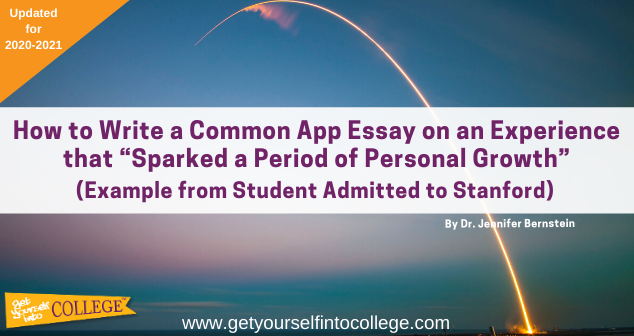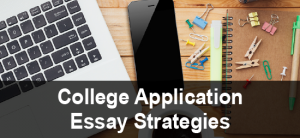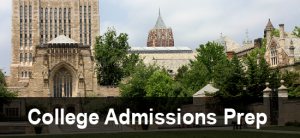Here’s one of the most popular Common Application essay topics that’s going to be used again in the 2020-2021 admissions cycle: “Discuss an accomplishment, event, or realization that sparked a period of personal growth and a new understanding of yourself or others.”
According to the Common Application, in the 2018-2019 cycle, 23.7% of students opted to write about an experience of personal transformation that changed their perception of themselves and others.
What you’re about to read is a significantly updated version of my original article.
Since publishing this article back in 2017, more and more of my own students have written amazing Common App essays on this topic.
As such, I’ve decided to update this article to share more insights into what does and doesn’t work when crafting narratives about experiences of “personal growth.”
Read the whole article or click on one of the following links to jump ahead to any section that interests you:
What DON’T Admissions Officers Want to See in Your Common App Essay?
What DO Admissions Officers Want to Read About in Your “Sparked a Period of Personal Growth” Essay?
Why Are Colleges Interested in Essays on Personal Growth?
What Are Some Unique Ways of Approaching the “Sparked a Period of Personal Growth” Essay?
Stanford Student’s Common App Essay on an Experience that “Sparked a Period of Personal Growth”
What DON’T Admissions Officers Want to See in Your Common App Essay?
Let’s start by stating the obvious.
Your track record—your record of past accomplishments—plays a significant role in the college admissions process.
Many students fixate on this part of how they’re going to be evaluated. Even the most talented students fall prey to this tendency because they want to emphasize all the amazing things they’ve done.
I get it.
This urge is understandable.
Rest assured that there are plenty of places in your application to showcase your accomplishments.
However, your Common Application essay ISN’T the place to just focus on what you’ve done.
Admissions officers don’t just want to read an essay that’s all about the end result or the “high impact” of your project, accomplishment, or whatever event it is that you’ve chosen to write about.
Every year, I have myth-busting conversations with students who are suffering under the mistaken idea that the Common App essay needs to be first and foremost a demonstration of some very significant high-impact thing they’ve done.
Pay close attention to my phrasing.
I’m NOT saying you shouldn’t include significant accomplishments in your Common App essay on a “period of personal growth.”
I AM saying that your essay shouldn’t just be about the accomplishments.
Click here to access all my tips, techniques, and case studies on writing great Common App essays.
What DO Admissions Officers Want to Read About in Your “Sparked a Period of Personal Growth” Essay?
The reality is that admissions officers are extremely curious about how YOU have been transformed by projects, experiences, and accomplishments.
Want to write a great Common App essay on something that “sparked a period of personal growth”?
Then, you need to share your process of transformation–your before, during, and after.
Just FYI, the best transformation narratives often feature both internal and external transformation.
Many students leap right over the “process” part of the essay. They want to jump from the “before” to the “after” because they feel the process–the “middle” or “during”–isn’t exciting or dramatic.
I know you want to dazzle the people reading your application essays.
However, mere “before and after” narratives aren’t as compelling to admissions officers as those that feature the “during.”
In addition to including the “during” part of your transformation, your “after” shouldn’t just focus on the external result (especially in the “sparked a period of personal growth” essay). Your “after” should include some philosophical contemplation of your transformation.
I strongly recommend that you read two articles:
“Two Elements of the Best Common Application Essays”
“Techniques Used in the Best College Application Essays”
These articles feature strategies to help you master the art of structuring your Common App essay and include analysis of actual student application essays.
Why Are Colleges Interested in Essays on Personal Growth?
The answer is simple and sometimes surprising.
Colleges aren’t just looking at your track record.
They’re also looking forward, out beyond what you’ve already accomplished. Admissions officers need to make what a former Yale president describes as a “hunchy judgement” about your potential.
When Stanford is reviewing your application, they’re looking for signs of your “intellectual vitality”–your “commitment, dedication and genuine interest in expanding your intellectual horizons” and “the initiative with which you seek out opportunities and expand your perspective.”
Harvard is considering some key questions when they’re reviewing your application: “Have you reached your maximum academic and personal potential?” Or “do you have reserve power to do more?” “How open are you to new ideas and people?” “Will you be able to stand up to the pressures and freedoms of College life?”
Yale is looking for a “desire and ability to stretch one’s limits.”
GROWTH. EXPANSION. POTENTIAL. OPENNESS.
College is a time of massive intellectual and overall personal growth.
Admissions officers at all colleges are looking for students who are open to this process of growth and have the underlying strategies for handling it.
The best, most memorable college experiences are often ones in which your mind is blow and your perspectives expanded in ways you never could have imagined in high school.
But how can you demonstrate your potential?
How can you demonstrate that you’re ready for the challenge?
Writing your Common App essay about an experience that “sparked a period of personal growth,” especially one that transformed your “understanding of yourself or others,” is an excellent way to show colleges you have the kind of qualities and capabilities described above.
Growth, expansion, openness, and transformation sound lovely. They sound positive. But anyone who has undergone a period of massive growth knows that it’s more complex than it sounds, and there are almost always setbacks and challenges along the way.
The “during” part of your essay is a great place to show that you’ve started cultivating the underlying skills that are essential for navigating your way through the growth process.
What Are Some Unique Ways of Approaching the “Sparked a Period of Personal Growth” Essay?
There are so many juicy possibilities for writing about an experience that “sparked a period of personal growth.”
Here are some things my students have written about. . .
Getting lost in a foreign city
Losing their passport
Changing a deeply held conviction based on the results of a research project or conversation
Getting called out by an employer for insufficient attention to details
Hurting someone’s feelings by acting in an ungrateful manner
Standing up to someone
Doing something way out of their comfort zone (e.g., working on a farm, going on a solo wilderness hike, etc.)
Taking charge of organizing a family holiday gathering due to a parent’s illness
Stanford Student’s Common App Essay on an Experience that “Sparked a Period of Personal Growth”
Student Background: One of my students who is studying engineering at Stanford was originally planning to write her Common App essay on the time she felt like a failure because she couldn’t answer a judge’s question. (Click here to read “How to Successfully Apply to Engineering Programs.”)
Problem: We both agreed that the first draft she wrote felt too stiff and formulaic.
She glossed over the experience with the judge. The experience just seemed like a gimmicky hook that led into a essay that was mainly about the impact her organization had on the young people in her community. That is, she was falling into the trap of trying to write a “LOOK AT WHAT I’VE DONE!!” essay that I mentioned earlier. Plus, the draft featured all the cliches guaranteed to make an admissions officer’s eyes glaze over in “I’ve read this same basic narrative a thousand times” boredom.
There wasn’t sufficient introspection. The juiciest parts of her experience–the ones that would probably matter most to college admissions committees–didn’t even make their way into her essay. The most interesting aspects of her experience had to do with the way she contemplated the implications of her inability to answer the judge’s question about how her project “could change children’s lives” and how this contemplation propelled her into a process of rethinking the nature of her engineering work and led to the development of her organization.
Solution: In our conversations, she shared how, up until that moment with the judge, she’d only really focused on pursuing her own intellectual interests. This experience of feeling dumfounded by the judge’s question was painful, but it set her off on a new journey that involved finding applications for her work that could benefit others. She started thinking about the needs of others, not just her own. As it turns out, this was an experience that “sparked a period of personal growth.”
As she worked through the details of this transformation in her goals and approach, she also began transitioning from always being the young person getting mentored to becoming a mentor for the next generation of budding scientists and engineers. One element of her “personal growth” had to do with this shift from always “taking” to being someone who does more “giving.” A fruit of this experience that “sparked a period of personal growth” was her development of what eventually became a high-impact and award-winning program for children in her city. This program was originally the narrative star of her essay (in terms of how much attention she gave it), but now it had even more impact because the whole personal backstory was there.
Our conversations focused on mapping out vivid anecdotes that helped admissions officers see her process of inner and outer transformation. She developed super specific “before, during, and after” anecdotes that also shed light on her family background and culture. She took readers on a journey that started with the seemingly simple question from a science fair judge that plunged her into a process of “personal growth” which ultimately resulted in a “new understanding” of herself and others.
Dr. Bernstein’s Commentary: This student’s essay was now far more psychologically and intellectually nuanced.
Her essay wasn’t filled with exaggerated external drama and didn’t have the light, whippy tone that many websites featuring sample application essays love to emphasize.
Once she let go of many of the common misunderstandings about what matters in this kind of essay, she wrote an essays that was true to her experience and style.
Her vivid “before, during, and after” anecdotes made it possible for readers to really see and feel her “aha” moment in action. It’s very satisfying when readers can feel the “aha”–when they can see your mind and heart in action.
Admissions officers aren’t just interested in the surface level of what your essay is about.
They’re also interested in your habits of mind–the way you make sense of your experiences, your level of self-awareness, and a whole host of other qualities.
Let’s end by connecting the student’s essay back to what I shared earlier about what Stanford, Harvard, and Yale are looking for in applicants.
Now her essay showed how she keeps “questing” and stretching herself. She’s demonstrating how she has “reserve power to do more” because each significant experience she has sparks more personal growth, contemplation, and action. She’s constantly deepening and expanding her perspectives to benefit not only herself but also others. So even though this essay started with what seemed like a moment of failure (not being able to answer the judge’s question), it was really about her own growth.
WAYS TO WORK WITH DR. BERNSTEIN!
Click here to learn how to schedule a private consultation with Dr. Bernstein.
Click here to learn more about Dr. Bernstein’s ongoing private college preparation and college admissions support.
Click here to learn about the online Get Yourself Into College® program.
Blog post image used: ©spacex/unsplash.com



